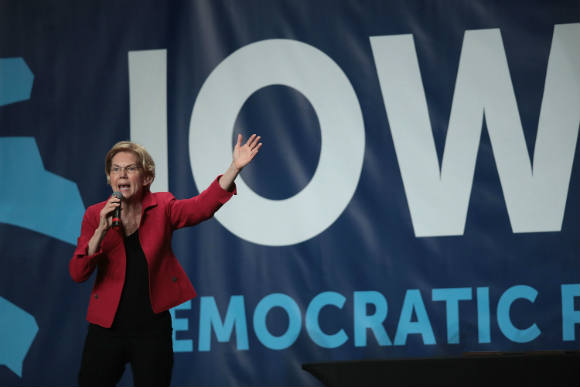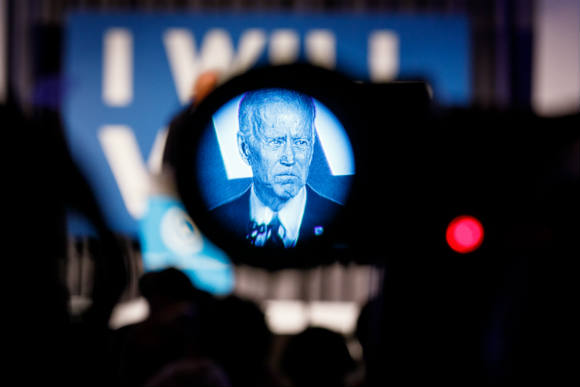The Hill’s Morning Report – Warren’s moment: Policy plans and rising polls


Welcome to The Hill’s Morning Report. Happy Tuesday! Our newsletter gets you up to speed on the most important developments in politics and policy, plus trends to watch. Co-creators are Alexis Simendinger and Al Weaver (CLICK HERE to subscribe!). On Twitter, find us at @asimendinger and @alweaver22.
After months of trying to gin up momentum for her 2020 bid, Sen. Elizabeth Warren (D-Mass.) is finally having a moment.
Buoyed by her continued string of policy proposals and her oft-used campaign line “I have a plan for that,” Warren has seen her stock rise and potentially alter the 2020 Democratic primary contest, especially with just over two weeks standing between the field and the first debate of the campaign.
As Niall Stanage writes, Warren’s ascent hurts Sen. Bernie Sanders (I-Vt.), with whom she’s jostled for control of the liberal lane of the primary contest while former Vice President Joe Biden reaches out for support from moderates. According to a CNN poll over the weekend, Warren now trails Sanders by a single point, closing a double-digit gap seen in polls for months.
More telling, Sanders advisers are starting to knife Warren in the press, with one telling U.S. News & World Report that Warren “fundamentally fails a basic threshold question: Can she beat Trump?” The adviser also criticized Warren’s decision to release a DNA test in late 2018 to prove she has Native American ancestors, albeit distant. Democrats are starting to see Warren’s campaign gain momentum after a slow start, while Sanders could be losing steam with some progressives.
“She certainly does seem to be taking votes away from him,” said Democratic strategist Julie Roginsky. “It seems as if, as she is rising, he is falling.”
With the first Democratic debates on June 26 and June 27, Warren’s timing may turn out to be ideal. The Massachusetts Democrat, a former professor, is known in Democratic circles as a formidable debater with stage presence.
The New York Times: Warren has lots of plans. Together, they would remake the economy.
With Warren on helium watch, Biden faces incoming as a wounded frontrunner. His 2020 opponents see a moment of opportunity. The former vice president’s lead in polls is smaller, particularly in Iowa, as he continues to fend off attacks from several rivals.
The barbs are still landing after Biden’s worst week on the campaign trail, which was headlined by his flip-flop on the Hyde Amendment, which bars federal funds from being used for abortions, following an outcry from progressive circles. Notably, while 2020 Democrats spent the last two weekends in San Francisco and Iowa, Biden skipped both. He especially drew the ire of California progressives for not showing up.
The tightening race imposes fresh scrutiny on the former vice president, raising questions about whether his politics are right for his party, and whether he’s taking too cautious an approach to the race. His critics are making unflattering comparisons to Hillary Clinton, undercutting Biden’s greatest strength as a candidate: that he can defeat President Trump, according to Amie Parnes.
As for the president, he is making his first stop during the 2020 cycle in Iowa today to headline both official and campaign events. Trump is expected to travel to Council Bluffs, to tour the Southwest Iowa Renewable Energy facility and tout the administration’s agriculture policies before attending a fundraiser for the Republican Party of Iowa in West Des Moines.
Notably, one person who will not be joining the president at the two stops is Sen. Chuck Grassley (R-Iowa). As his spokesperson noted, Grassley hasn’t missed a vote in over 25 years and won’t be breaking his streak today.
Trump will not be the only draw in the state. Biden is scheduled to hold a trio of events throughout the day in his second visit to the Hawkeye State (The Hill).
The New York Times: Trump needs a target to stay interested in his campaign. For now, it’s Biden.
CNN: Sen. Kamala Harris (D-Calif.) fights perception that she is overlooking Iowa.
Politico: Biden’s slow rollout rankles Iowa Dems.
The New York Times: Trump’s competition for most unpopular politician in New York: New York Mayor Bill de Blasio.
Politico: Sen. Kirsten Gillibrand (D-N.Y.) locks up June debate spot.

LEADING THE DAY
CONGRESS: For once, cooler heads have prevailed between House Democrats and the Department of Justice, temporarily at least.
The two sides de-escalated tensions for the first time in months by reaching an agreement that will provide lawmakers with critical documents underlying special counsel Robert Mueller’s report on Russia’s election interference. The move comes after weeks of stonewalling from the White House as the House Judiciary Committee continues to investigate Mueller’s report and whether the president obstructed justice.
The agreement also staves off a planned contempt vote on Tuesday, which was directed at Attorney General William Barr and former White House counsel Don McGahn. As Mike Lillis and Jacqueline Thomsen report, Democrats have instead opted to bring a softer resolution to the House floor that grants the Judiciary Committee new legal tools to obtain disputed information and stops short of holding Barr and McGahn in criminal contempt.
“Given our conversations with the Department, I will hold the criminal contempt process in abeyance for now,” House Judiciary Committee Chairman Jerrold Nadler (D-N.Y.) said Monday in a statement. “We have agreed to allow the Department time to demonstrate compliance with this agreement.”
The agreement also came hours after the committee kicked off hearings into Mueller’s report, headlined by testimony from former White House counsel John Dean, who served former President Nixon during the Watergate scandal. Democrats sought to use the testimony of Dean, a known critic of the president, to clear up key details from the report, while Republicans tried to undercut his credibility (The Hill).
The Associated Press: House resolution would make it easier to enforce subpoenas.
Politico: Alliance between Speaker Nancy Pelosi (D-Calif.), Nadler strained by impeachment divide.
> Deliberations in Congress over an impeachment inquiry, which Rep. Justin Amash of Michigan has been alone among House Republicans saying he supports, compelled him to quit the conservative Freedom Caucus late Monday. Members of the caucus voted in May to condemn the congressman, who was a founding member, although the group did not expel him for his stance (The Hill).
> GOP lawmakers are breathing a sigh of relief after Trump struck a deal with Mexico to deploy 6,000 Mexican national guard troops to Mexico’s border with Guatemala and to expand Migrant Protection Protocols to deal with the illegal immigration surge, but they realize this isn’t the end of the crisis.
As Alexander Bolton reports, Senate Republicans this week plan to debate asylum reform and humanitarian aid. The question is whether they can get any Democratic support, especially after billions in humanitarian aid did not make it into the $19.1 billion disaster assistance package, which the White House fought for before it was excluded from the package.
Democratic leaders are hesitant to give the president a victory on his signature issue, especially with the 2020 campaign taking hold outside of Washington.
> Senate Republicans are warning the White House that former Virginia Attorney General Ken Cuccinelli (R) will not be confirmed by the Senate after the president tapped him to serve as the acting head of U.S. Citizenship and Immigration Services (USCIS).
Trump has not said whether Cuccinelli would serve on a permanent basis or have his nomination sent to the Senate, but Senate Republicans were quick to point out that he will not have the support necessary for confirmation, with some pointing to his past as a GOP rabble rouser and serving atop the Senate Conservatives Fund.
“He’s made a career of attacking other Republicans and frankly attacking President Trump, so I doubt he’ll have the support to get confirmed,” said Sen. John Cornyn (R- Texas).
Sen. John Thune (R-S.D.), the No. 2 ranking Senate Republican, told reporters that Cuccinelli would have a “hard time getting confirmed” if he is nominated (The Hill).
The Washington Post: House Democratic leaders postpone vote on part of spending bill over congressional pay raise.

IN FOCUS/SHARP TAKES
WHITE HOUSE & ADMINISTRATION: Fresh from defending a deal with Mexico that he says will tame illegal migration because he threatened Mexico with new tariffs, Trump on Monday turned his attention back to China, vowing to raise tariffs on more Chinese goods if President Xi Jinping refuses to meet with him in Japan later this month.
Trump has used tariffs as leverage with European allies, hemispheric neighbors Canada and Mexico and Asian trading partners including Japan and China. A tariff threat to try to schedule a meeting with a reluctant head of state was a new use of Trump’s favorite international pry bar. What is less clear is the effectiveness of the technique.
The Washington Post: If Xi doesn’t meet with him at the Group of 20 summit in Japan this month to talk about trade differences, Trump said he will impose new tariffs on $300 billion in Chinese imports.
“China is going to make a deal because they are going to have to make a deal,” Trump said during what appeared to be a spur-of-the-moment phone interview with CNBC on Monday morning.
Chinese officials, who have met for months with U.S. negotiators about trade and intellectual property, have refused to say if Xi will sit down with Trump during the G-20 gathering.
The president and Secretary of State Mike Pompeo continued to defend an agreement signed with Mexico last week, which analysts say repackaged pre-existing commitments in the wake of Trump’s threat to impose escalating 5 percent tariffs on all goods imported from Mexico unless there was cooperation. Friday’s agreement voided Trump’s threatened levies for at least 90 days.
Mexican Foreign Minister Marcelo Ebrard said no secret immigration deal existed between his country and the United States, contradicting Trump’s claim on Twitter that a “fully signed and documented” agreement would be revealed soon with provisions that were not disclosed last week. Trump’s remarks appeared to be a veiled reference to treating Mexico as a functional “safe third country” for the purposes of U.S.-bound asylum-seekers.
Ebrard, speaking to reporters in Mexico City, said the two governments agreed to evaluate the flow of migrants going forward and that if the number crossing the southern border into the United States was not significantly reduced, discussions would resume about changing regional rules affecting migrants fleeing their home countries to claim asylum (The New York Times).
The Associated Press: Trump insists the U.S.-Mexico deal adds up to more than meets the eye.
“We have an agreement on something they will announce very soon. It’s all done,” Trump told reporters. “It was all done because of the tariffs and the relationship with Mexico.”
Pompeo appeared in the State Department briefing room on Monday to defend last week’s strides with Mexico as “a fundamentally different agreement” than the border security and asylum provisions worked out months ago between the two governments.
The secretary said the administration will gauge whether illegal immigration into the United States declines enough over the next three months to avert new tariffs on Mexico after evaluating the situation “literally daily.” Pompeo declined to define the yardstick the administration will use.
The Washington Post: Mexico talked the U.S. out of tariff threat with promises of tougher immigration crackdown if initial efforts do not deliver quick results.
> A federal subcontractor working for the Customs and Border Protection Agency downloaded tens of thousands of images of travelers and license plates before a digital breach of the company’s network resulted in theft of images taken at one port of entry over a six-week period. The border agency is part of the Homeland Security Department, the part of the federal government responsible for cybersecurity inside the United States (The New York Times).
> Within DHS, Acting Inspector General John V. Kelly retired early after criticism that he urged auditors to create “feel good” reports about the performance of the Federal Emergency Management Agency. Deputy Inspector General Jennifer Costello steps in as the acting internal watchdog at DHS today (NBC News).
> CIA: The slain half brother of North Korean leader Kim Jong Un, who was killed in 2017 when two women smeared his face with deadly VX nerve agent in an airport, was an informant for the Central Intelligence Agency who met several times with agency operatives (The Wall Street Journal). South Korean agencies said they cannot confirm the Journal report (Reuters).
The Morning Report is created by journalists Alexis Simendinger and Al Weaver. We want to hear from you! Email: asimendinger@digital-release.thehill.com and aweaver@digital-release.thehill.com. We invite you to share The Hill’s reporting and newsletters, and encourage others to SUBSCRIBE!
OPINION
Tariffs are too blunt a tool for migrant talks with Mexico, by Jason Marczak, opinion contributor, The Hill. https://bit.ly/2ZpXer9
Impeachment will reelect Trump, by Ford O’Connell, opinion contributor, The Hill. https://bit.ly/2IxJl3f
WHERE AND WHEN
Hill.TV’s “Rising” program features George Mason University professor Justin Gest on immigration solutions; Catholic University of America professor Matthew Green about his book “Legislative Hardball: The House Freedom Caucus and the Power of Threat-Making in Congress” and Nevada state Sen. Yvanna Cancela, a Democrat, who touts the nation’s first majority-female legislature. Watch at 9 a.m. ET at http://digital-release.thehill.com/hilltv, or on YouTube at 10 a.m. at Rising on YouTube.
The House meets at 10 a.m.
The Senate convenes at 10 a.m. and resumes consideration of Sarah Daggett Morrison to be a U.S. district judge for the Southern District of Ohio. Kevin McAleenan, acting secretary of Homeland Security and commissioner of U.S. Customs and Border Protection, will testify at 10 a.m. before the Senate Judiciary Committee about the “Secure and Protect Act,” a measure focused on improving border security.
The president flies to Iowa to tour the Southwest Iowa Renewable Energy facility in Council Bluffs and to speak about renewable energy. Later today, he addresses the Republican Party of Iowa annual dinner in West Des Moines.
Treasury Secretary Steven Mnuchin participates in a discussion at 2:35 p.m. during the Wall Street Journal CFO Network Annual Meeting at the Park Hyatt in Washington.
The Hill hosts a live event at 8:30 a.m. at the Newseum called “Affordable Housing & the American Dream,” featuring Reps. Emanuel Cleaver (D-Mo.) and Steve Stivers (R-Ohio), co-chairs of the Congressional Public Housing Caucus. The lawmakers will be followed by a panel discussion with housing policy experts. Steve Clemons, The Hill’s editor-at-large, moderates. Information is HERE.
ELSEWHERE
➔ State Watch: Texas Republican Gov. Greg Abbott, with the stroke of a pen on Monday, raised his state’s legal age to purchase tobacco products to 21 beginning Sept.1, with the exception of military personnel. Texas joins California, New Jersey, Oregon, Massachusetts, Arkansas and Virginia in raising the age as a way to reduce tobacco and nicotine addiction (ABC 13).
➔ Supreme Court: Justices did not comment on Monday when they rejected a challenge to federal regulation of gun silencers, just days after a gunman used a silencer in Virginia during a mass shooting that killed 12 people. The court turned away appeals from two Kansas men convicted of violating federal law regulating silencers. They argued the constitutional right “to keep and bear arms” includes silencers (The Associated Press).
➔ Catholic Church: The Vatican on Monday rejected the idea that people can choose or change their genders, releasing an official document describing the sexual “complementarity” of men and women to procreate. The Catholic Church’s edict that people cannot choose genders was initially described by Pope Benedict XVI in 2012 and has since been endorsed by Pope Francis (The Associated Press).
➔ Cyber: The Hill’s Morgan Chalfant interviewed former National Security Agency Director Mike Rogers about his private sector approach to a familiar mission: trying to prevent cyberattacks in the United States, including by foreign intruders. One recommendation he offered members of the public: Read the Mueller report. … Meanwhile in Maine, lawmakers and internet service providers are coming to grips with a new state law that makes selling customer data illegal without consent and could have cybersecurity consequences nationwide (The Hill).
THE CLOSER
And finally … Owner Saudi Crown Prince Mohammed bin Salman has the painting “Salvator Mundi,” celebrated as a masterpiece by Leonardo da Vinci, on his yacht “Serene,” according to Artnet.com, adding new details to a mystery about the painting’s location (Bloomberg).
The $450 million “Salvator Mundi,” which sold for a record sum at Christie’s in 2017 and inspired the book “The Last Leonardo,” was expected on display at the Louvre to mark the 500th anniversary of da Vinci’s death later this year. However, some Louvre curators reportedly believe the painting is not a solo work by da Vinci, and might have been completed by the artist’s assistants, in which case bin Salman owns a lovely workshop canvas worth far less than $450 million (Art&Seek).

Copyright 2023 Nexstar Media Inc. All rights reserved. This material may not be published, broadcast, rewritten, or redistributed.

